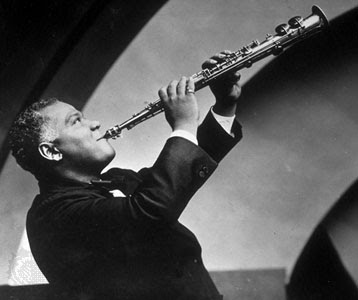In 1919 he joined Will Marion Cook's orchestra and toured Europe for the first time. It's also where he bought his first soprano sax, making it his main instrument from that point on. Although his playing was received with much acclaim, his temperament landed him in jail in London for 13 days for assaulting a woman and he was deported back to the States.
Bechet joined Clarence Williams on his first recordings in 1923, making "Wild Cat Blues" and "Kansas City Man Blues", making him the first important jazz soloist to record, beating Louis Armstrong by a few months. For the next two years he would continue to make records backing blues singers and even playing with Duke Ellington's orchestra for a short period. In 1925 he joined the "Revue Negre", which also included Josephine Baker, and traveled to Europe again. He toured Europe with several small bands, making it as far as Russia, until 1928 when he lead his own small brand at Bricktop's Club in Montmartre, Paris.
Once again his temper got the best of him and he was jailed in Paris when a woman passer by was wounded in a shoot out with another musician. Legend has it that the other man accused him of playing a wrong chord and Bechet challenged him to a duel. Other reports say Bechet was ambushed by the other man. He was sent home after being released and landed in New York right after the stock market crash in 1929. Noble Sissle picked him up for his band and Bechet returned to Europe to tour again, largely avoiding the difficulties in the U.S. caused by the Depression.
Bechet returned to New York in 1932 and formed a band with Tommy Ladnier, playing at the Savoy Ballroom and in clubs but work began to become scarce. He opened a tailor shop with Ladnier to make ends meet but it operated more as a place for jam sessions than a business. In 1938 he had a huge hit with a recording of "Summertime" and went on to make several other strong recordings but by the 40's, jobs were not forthcoming. Once again he headed to Europe and this time, decided to relocate for good.
In 1950 he played at the Paris Jazz Fair and became a sensation over-night. Within a couple of years he became a huge celebrity and national hero in France, assuring himself plenty of well paying jobs. His hit records rivaled those made by pop stars of the day but he remained largely under appreciated in the U.S. Bechet's later life in Europe was filled with success including exciting concerts, popular recordings including his international hit "Petite Fleur", and a classic ballet score, "La Nuit est sorciere", and the occasional trip back to the U.S. He died in Paris of stomach cancer at the age of 62.
Bechet played with intensity and passion, with a wide vibrato that dominated. He played up front while the trumpets and other instruments took a backseat. He read music but often chose not too, being a master improvisor. Duke Ellington said of him, "Bechet to me was the very epitome of jazz...everything he played in his whole life was completely original. I honestly think he was the most unique man to ever be in this music."

One of my favorite jazz tunes, "Blues My Naughty Sweetie Taught To Me", was covered beautifully by Mr. Bechet.
ReplyDelete